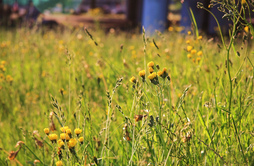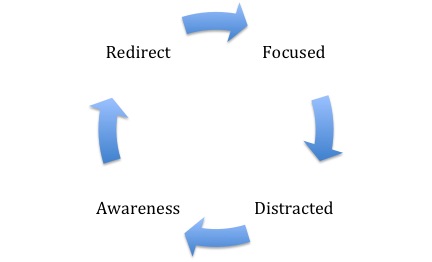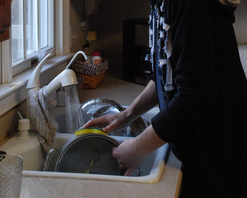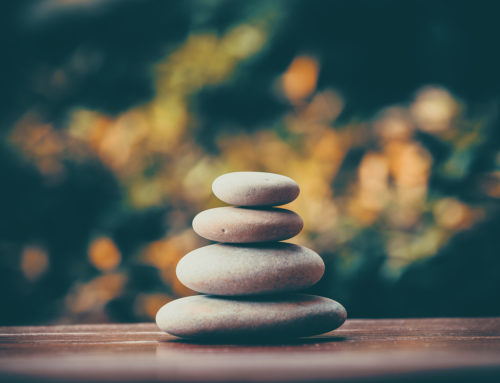When I was on retreat with the Zen master Thich Nhat Hanh, I heard him describe the mind like a garden – it has limited space for things to grow. As such, you need to be careful what sprouts you nurture. Otherwise you could end up with a garden full of weeds, and not enough nourishment to feed the plants you truly want to nurture. Mindfulness, when practiced regularly, can help you develop the ability to be more conscious of your choices in every moment of every day.
 So if regular practice of mindfulness is necessary for you to become the person you want to be, then it’s essential you find a way to practice it regularly that is sustainable. Like any other change you want to make in your life – you have to find manageable ways to integrate it into your daily routines until it, itself, becomes a habit.
So if regular practice of mindfulness is necessary for you to become the person you want to be, then it’s essential you find a way to practice it regularly that is sustainable. Like any other change you want to make in your life – you have to find manageable ways to integrate it into your daily routines until it, itself, becomes a habit.
Fortunately, mindfulness practice is infinitely flexible and tailorable. Virtually anything can become a mindfulness practice, as long as you have a basic sense about what the process really is. You can do mindful walking, mindful eating, or even mindfully preparing food and washing dishes! It’s all about how you approach the activity.

Usually people start by focusing on their breath, because it helps minimize distractions. When you close your eyes and are still, you can more easily just focus your attention on one thing – in this case, the experience of your breath. When you try it, you’ll begin to see that there are actually quite a lot of things to notice – the smells, the sounds, the physical sensations of the breath entering and leaving the body. As crazy as it may sound, it can become overwhelming!
Following your breath is a great way to get a personal, deeply felt sense of the process underneath the practice – which is, in fact, the whole point of the practice. Then, once you get the hang of it, you can take that attention and focus on something else – like mindful eating for example. You just focus as completely as you can on the sensory experience of eating – the tastes, smells, and textures of it. As your mind wanders from the experience, you just continually bring it back to the experience of the present moment – without judgment. You don’t evaluate the content of the thoughts just as you don’t evaluate yourself for having them. You just continually redirect yourself to the experience of eating. Again and again.
 It’s the same idea with mindfully washing dishes – you just start out focused on how your senses are experiencing the dishwashing process: how does the soap really feel on your hands? What sounds do you hear as you work? You learn how to keep yourself from getting trapped into thoughts like “why weren’t these dishes soaked?” or “why did I eat that meal?” or “what am I going to do tomorrow?”. Every time your mind wanders, you just gently bring it back to the task at hand, over and over again.
It’s the same idea with mindfully washing dishes – you just start out focused on how your senses are experiencing the dishwashing process: how does the soap really feel on your hands? What sounds do you hear as you work? You learn how to keep yourself from getting trapped into thoughts like “why weren’t these dishes soaked?” or “why did I eat that meal?” or “what am I going to do tomorrow?”. Every time your mind wanders, you just gently bring it back to the task at hand, over and over again.
Just do one thing at a time. Whatever that thing is.
Here’s how to make mindfulness practice work for you in a sustainable way:
- Start with a basic breathing practice. Use a recording, join a meditation group, do it silently alone – whatever works for you. Sit quietly, close your eyes and just simply practice putting your full attention to your breath. Just find a way to do it and start scheduling it regularly. Start small – maybe only 5 minutes at a time. Build up to a longer practice as you can.
- Once you have a sense of what it is like to practice mindfulness by focusing on the breath, consider branching out to something you already do regularly or really want to start doing more of – like mindful walking, cooking, or eating. Schedule time to practice the activity mindfully. If you are short on time, you can schedule a bunch of “mini-meditations” throughout the day. These include things like taking one mindful bite at the beginning of each meal, or setting an alarm on your phone to go off a few times during the day to remind you to just stop and take one or two mindful breaths. Practice often.
- Switch it up! If you find you don’t like one mindfulness practice, do another one. You can do just about any activity mindfully – you just have to do it!
Need help? I can work with you one-on-one to help you develop a sustainable mindfulness practice that is tailored to fit into your life. Contact me if you are interested in learning more.





